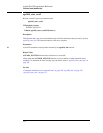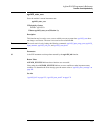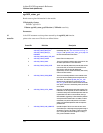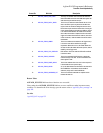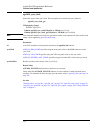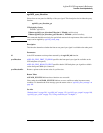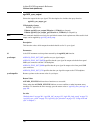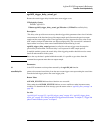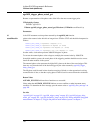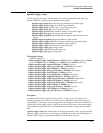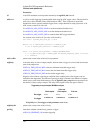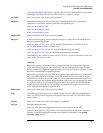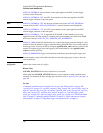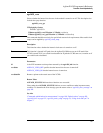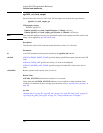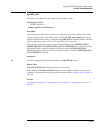
182
Agilent E1439 Programmer's Reference
Functions listed alphabetically
age1439_trigger_phase_actual_get
Returns a representation of the phase value of the LO at the most recent trigger point.
VXIplug&play Syntax
#include "age1439".h
ViStatus age1439_trigger_phase_actual_get(ViSession id,ViPInt16actualPhasePtr);
Parameters
id is the VXI instrument session pointer returned by the age1439_init function.
actualPhasePtr points to the returned value which is an integer from −32768 to 32767 and should be interpreted as
follows:
AGE1439_TRIG_PHASE_0 represents 0 degrees (or 0)
AGE1439_TRIG_PHASE_90 represents 90 degrees (or 16384)
AGE1439_TRIG_PHASE_180 represents ±180 degrees (or -32768)
AGE1439_TRIG_PHASE_270 represents +270 (-90) degrees (or -16384)
In other words, each count represents 360/65536 degrees of phase.
To convert the returned phase value to degrees, multiply the returned value by 360/65536.
In multiple module systems, the actual phase of the triggering module should be used to correct
data from other modules in the system.
The returned phase value represents the digital LO’s phase at the time of the actual trigger. This
time may vary from the time of the desired trigger by the value returned by age1439_trigger_
delay_actual_get.
The LO phase could be used in time domain averaging of blocks, or other operations involving
zoomed blocks of data, so that the varying phase of the LO can be removed from the calculation.
Return Value
AGE1439_SUCCESS indicates that a function was successful.
Values other than AGE1439_SUCCESS indicate an error condition or other important status
condition. To determine the error message, pass the return value to “age1439_error_message” on
page 102.
See Also
“age1439_init” on page 132, “age1439_trigger_setup” on page 183, “age1439_trigger_delay_
actual_get” on page 181, “age1439_frequency_setup” on page 128, “Delay and phase in triggered
measurements” in chapter 3, “Trigger and phase in multi-module systems” in chapter 3



